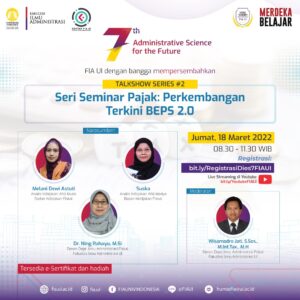
Base Erosion and Profit Shifting(BEPS) is a term used by member countries of the G-8, G-20 and The Organization for Economic Co-operation and Development(OECD) to describe the business practices of many multinational companies (Multinational Entities/MNEs) to transfer their business profits through transfer pricing schemes to countries that apply low/zero tax rates (Wells and Lowel, 2013: 2). BEPS 2.0 is a continuation of the BEPS action plan established by the previous OECD. Head of the Department of Fiscal Administration, Faculty of Administrative Sciences, University of Indonesia (FIA UI), Dr. Inayati, M.Sc., said that the development of BEPS 2.0 is a very important theme to be discussed because of the many developments in transactions in the world which are a challenge for all tax authorities around the world.
On this basis, Faculty of Administration Universitas Indonesia (FIA UI) held an International Tax Webinar with the theme “BEPS 2.0 Recent Developments” as one of the series of Faculty of Administration UI Anniversary on Friday (18/3/2022). “In this Webinar, we will find out what the perspective of policy makers and academics is regarding the latest BEPS policy with all its challenges,” said Inayati.
Associate Expert Policy Analyst at the Center for State Revenue Policy, Fiscal Policy Agency, Suska explained material related to the development of BEPS 2.0-Pillar 1. This pillar introduces a new approach to allocating taxation rights, namely by considering the amount of user participation, intangible assets related to the marketing function (marketing intangible), and the existence of significant economic activities (significant economic presence).
He further said that the scope of imposition of Pillar 1 is MNEs with a consolidated turnover exceeding EUR20 billion and a profit above 10%. However, there are exceptions for extractive industries and regulated financial services. MNEs are companies or corporations that have their place of business in many countries, and own or utilize what are known as Global Value Chains (GVCs).
“For the allocation method, it is a portion of 25% of residual profit. Meanwhile, for certainty, use the early certainty mechanism and disputeresolution through mutual agreement procedures and the formation of panels. Lastly, is implementation through multilateral conventions that will be signed in mid-2022 and effective implementation at the end of 2023,” said Suska.
Meanwhile, Young Expert Policy Analyst, Center for State Revenue Policy, Fiscal Policy Agency, Melani Dewi Astuti explained related to Pillar 2. She said Pillar 2 has a scope of imposition, namely MNEs of multinational companies in the group whose constituent entities are members of the MNE Group that have income. Annually EUR750 million or more in the Consolidated Financial Statements of Parent Entity (UPE) UI in at least two of the four fiscal years prior to the Fiscal Year under test.
Pillar 2 explains the global minimum tax, especially through the Income Inclusion Rule (IIR) scheme, which will ensure that multinational companies that meet certain criteria (meet the specified threshold), wherever they are, will pay an effective corporate income tax rate of 15%.
“As for Pillar 2, the global minimum tax is a means to protect Indonesia’s tax base, because with the minimum tax rate, the pressure to engage in tax competition on the grounds of competitiveness will be reduced. The global minimum tax can also reduce the role of tax havens, resulting in a more concise transaction scheme. In the Indonesian context, the global minimum tax will have an impact on multinational companies whose parent UPE is domiciled in Indonesia or multinational companies that run their operations in Indonesia,” he explained.
Then, the Lecturer of the Department of Fiscal Administration, FIA UI, Dr. Ning Rahayu, M.Sc., said that Pillar 2 is not in line with BEPS, especially Action5 (Harmful Tax Practice). Because through Pillar 2, companies that carry out substantive economic activities and receive tax incentives will be subject to tax or top up taxin the country of domicile..



